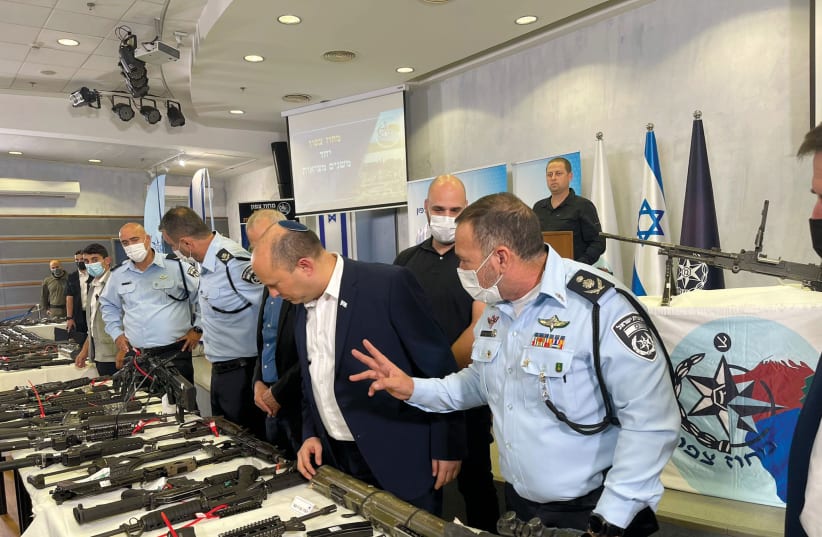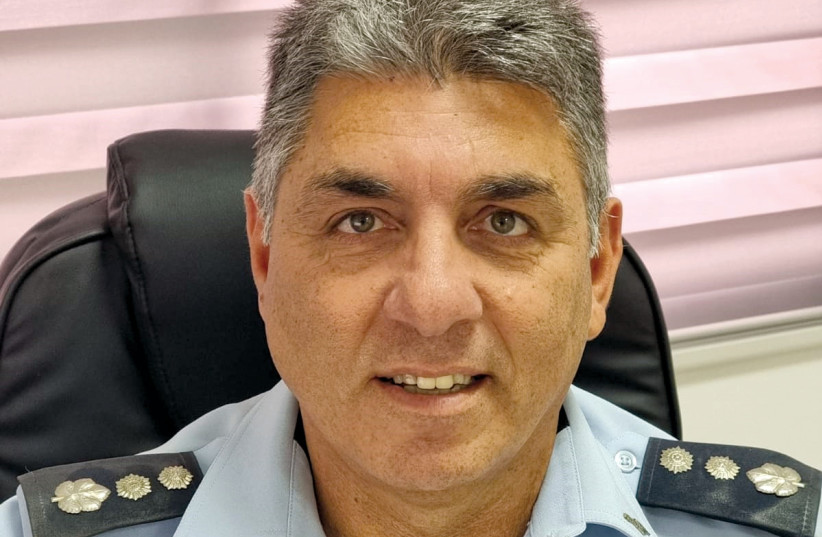The Israel Police recently released a tape of a phone conversation in which a 70-year-old grandfather is threatened by two men with violence to him and to his family if he doesn’t send them a considerable sum of money as interest for a loan.
“Old man, I am an honorable person. My name goes before me. I don’t want to have to do [violent] stuff because of small money,” one of the men is heard saying, before putting his young grandson on the phone.
“You will cry over your husband’s [body], you will see. You will beg to me. We will cut your husband into pieces and you will beg,” the men were also quoted as saying, presumably to the man’s wife.
The extortion attempt was just one of many incidents that detectives from the police’s Tel Aviv district secretly recorded. On Monday the two men were arrested and indicted for extortion, money laundering and demanding illegal interest payments.
The two men belong to the Jarushi family, one of the most dangerous crime families in the country, which has been embroiled in a bloody family feud that has led to at least four deaths since the beginning of the year. Their arrest is an achievement, but is just one operation among many that the police have carried out in the past few months as part of the government’s effort to fight Arab crime, which it has designated as one of its top priorities.
THE GOVERNMENT developed a two-pronged strategy. The first is a NIS 30 billion five-year plan for broad investment in the Arab sector, including education, sports, infrastructure, welfare and housing, and involving nearly every government ministry. The plan’s funding was signed into law as part of the national budget in November.
The second is a six-month emergency operation named “Safe Track.” The operation’s stated goal is to deal with crime in the Arab sector and strengthen governance and deterrence in Arab towns.
The operation is being spearheaded by the Israel Police but involves all law enforcement agencies, including the tax authorities and justice system.
It officially began on October 17, and was put under the responsibility of Deputy Public Security Minister Yoav Segalovitz (Yesh Atid), himself a career police officer who served in a number of key positions such as the head of Lahav 433 (Israel’s version of the FBI) and head of the unit that deals with economic crime.
Safe Track is garnering significant attention from the media for a number of major operations. For example, “Operation Ocean” involved a member of a crime gang who had crossed the lines and had acted as a mole for nearly a year. The information he provided led to a gun bust on the night of November 8, involving approximately 1,600 police officers, including special forces and Border Police, and resulting in the seizure of approximately 40 rifles, 13 pistols, two machine guns and two explosives linked to a cellphone, as well as 64 arrests from 25 different localities across the country.
Another high-profile operation, “Operation Sunlight,” involved similar tactics but this time led to a large drug bust in the Negev. A covert operative was inserted into a crime syndicate and collected incriminating evidence, using advanced technologies, that included the purchase of ecstasy, crystal meth, MDMA and 2C-B (known in Israel as Dosa).
The evidence led on December 21 to the simultaneous arrest of dozens of drug dealers, mostly from the Bedouin communities in the South. The arrests were carried out by dozens of police officers from an array of units, including riot police, border policemen and sniffer dogs from the police’s canine unit.
Just this week, on Tuesday, the police carried out another major operation, this time in Kafr Kanna. Policemen confiscated many gun parts, ammunition and an airsoft gun, which is used mostly for close combat training. They also handed out fines worth approximately NIS 100,000 for a series of infractions.
Despite these high-profile operations and many others, including the appropriation of dozens of valuable cars that belonged to crime bosses and served as instruments for tax evasion, some of Safe Track’s most interesting components are happening quietly, behind the scenes. This work is being carried out by a discreet police branch called “Saif Branch” (“saif” is Arabic for sword) that was established on August 11 specifically for this purpose.
“Saif Branch is essentially a body of experts [on Arab affairs] that reports directly to the commissioner,” explains Cmdr. Yigal Ezra, head of the Department for Crime Prevention in the Arab Sector, one of Saif’s three major departments. “We gathered all of the advisers on Arab affairs from the districts and put them together,” he says.
“We collect information from all of the districts and synthesize them in order to conduct in-depth investigations into the major family feuds in the Arab sector,” Ezra continues. “For Safe Track, it was decided that the police will be the motor, and we [at Saif Branch] will receive the best situational assessments and function as the fuel that runs the motor. We focus on [discovering] what needs to be worked on – what and who,” he adds.
“Most of the researchers are from the Arab sector themselves – Muslims, Christians and Druze. Some of our researchers come from families that were hurt by crime, who really feel the pain.”
The new branch is headed by Asst.-Ch. Jamal Hacrush, the first Muslim Arab-Israeli to reach that rank, and whose own Kafr Kanna home was the target of a drive-by shooting in September.
Other than Ezra’s crime prevention department, the branch has two others: Properties and Collaborations. The Properties Department is responsible for opening new police stations in the Arab sector – five have been opened in recent years, and the police aim to open three more in the near future. The Collaborations Department is responsible for outreach to communities in order to build trust between them and the police. It also operates a New Media division in order to interact with Arab teens and young adults at eye level on their social media platforms, as well as to identify potential criminal activity.
THERE ARE three tiers of criminal activity, Ezra explains.
The first is the crime syndicates, the three leading ones being family-based: Jarushi, two members of whom were arrested on Monday for extortion, and whose phone threats were recorded above, Hariri, and Abu Latif. According to Ezra, the three families heavily influence the violence and illegal commerce.
The second tier are mid-level crime gangs, and the third tier includes specific districts (not people) that suffer especially from crime and low governance.
While Ezra’s department initially compiled a list of 236 “targets” – criminals – it has now increased that number to 366, and will keep adding more.
“We want to add people [to the list] both from the crime syndicates and from the local crime gangs,” Ezra explains. “We learned over time that 236 is not enough, and neither is 366. We need to get to everyone,” he says.
Once a “target” is identified, his or her information is passed on to the entire law-enforcement apparatus, including the tax authorities and both local and international justice systems.
The authorities pool all the relevant information they have on each target, and then pass the baton on to the police’s operational units, who build an “attack plan,” a plan whose ultimate goal is to have the targets indicted and jailed until the end of the legal proceedings – in other words, to get them off the streets.
ACCORDING TO information released by the police on Thursday, Safe Track has led so far to 62 indictments, out of which 51 were jailed until the end of legal proceedings.
In 251 raids and searches the police confiscated dozens of expensive cars and over NIS 11 million in cash. It also uncovered and shut down butcheries connected to crime networks that sold adulterated meat. The police also announced on Thursday that, due to its success, the operation will run for at least eight months instead of the original plan of six.
Despite these achievements, the number of killings and shootings has not decreased since the operation began in October. Ezra admits that more needs to be done, but is convinced that change is already beginning to be felt on the ground.
“Of course, the activity looks at the long term, but already now it is creating deterrence. Some [criminals] are moving abroad, some are lowering their profiles; [we are] increasing governability where previously it was weak,” he says.
He then reveals another facet of his activity that he believes will make a difference in the long term: after gaining a clear picture of the feuding crime families and their hierarchies, his department then tries to intervene, and even solve, some of the disputes, in order to dissuade crime bosses from sending out their “soldiers” on criminal and sometimes lethal missions in the first place.
“If we dry up the swamp where the [hit] jobs come from, there won’t be any jobs to do,” Ezra explains.
This method is not new to Ezra and is imported from his past experience. In his previous role, including during Operation Guardian of the Walls, Ezra served as the Center District’s chief of interrogations and intelligence, and before that as the head of the Lod police station. During his time in Lod, Ezra gained vast experience in settling disputes among feuding families, and his intimate knowledge of the city helped diffuse the tensions during the May riots.
IN THIS context I bring up the issue of Arab youth rioting in mixed cities during the operation, and ask him if he thinks the rioters were motivated by nationalism and anti-Israeli sentiment, as many on the Right have claimed, or a spillover of anger over inequality and neglect of the Arab communities’ youth, which has caused many of them to choose crime, a narrative adapted by many on the Left.
Despite this question being a political bone of contention, Ezra’s answer is terse and unequivocal: the riots were 100% related to crime.
“When normative youth have inadequate education and no structured leisure time, they end up getting caught up in criminal activity,” he explains. “The social aspect is what will make the difference in the next war or [next] Guardian of the Walls. This is long-term, meant to make a difference at an early stage.”
Despite his tough-guy persona, he seems most passionate about this issue and reveals a softer side. He explains that much of an average Arab teen’s interaction with state authorities is when he or she encounters the police. Since the police represent a threat, these teens come to view the state as being a threat as well.
According to Ezra, a change in the perception of the police in the community can generate real change. In other words, what really makes the difference is education. Ezra sees this as an integral part of crime prevention, and his department is acting on this front as well.
When asked for an example, Ezra describes an initiative where policemen from the Arab sector held town hall meetings at the homes of people from their districts.
“The [Arab] public is beginning to understand that there is finally someone who cares about them, and beginning to tell itself that enough is enough,” he says.
“I am interested in the 95% of the citizens who are normative, not just the 5% on the fringes,” he said. “We are bringing the citizen closer to the policeman, and the policeman closer to the citizen.”

